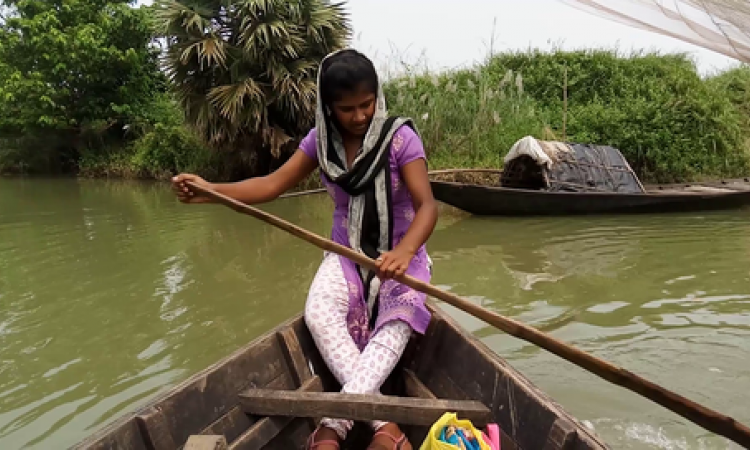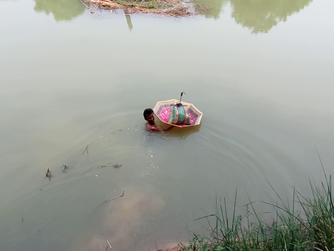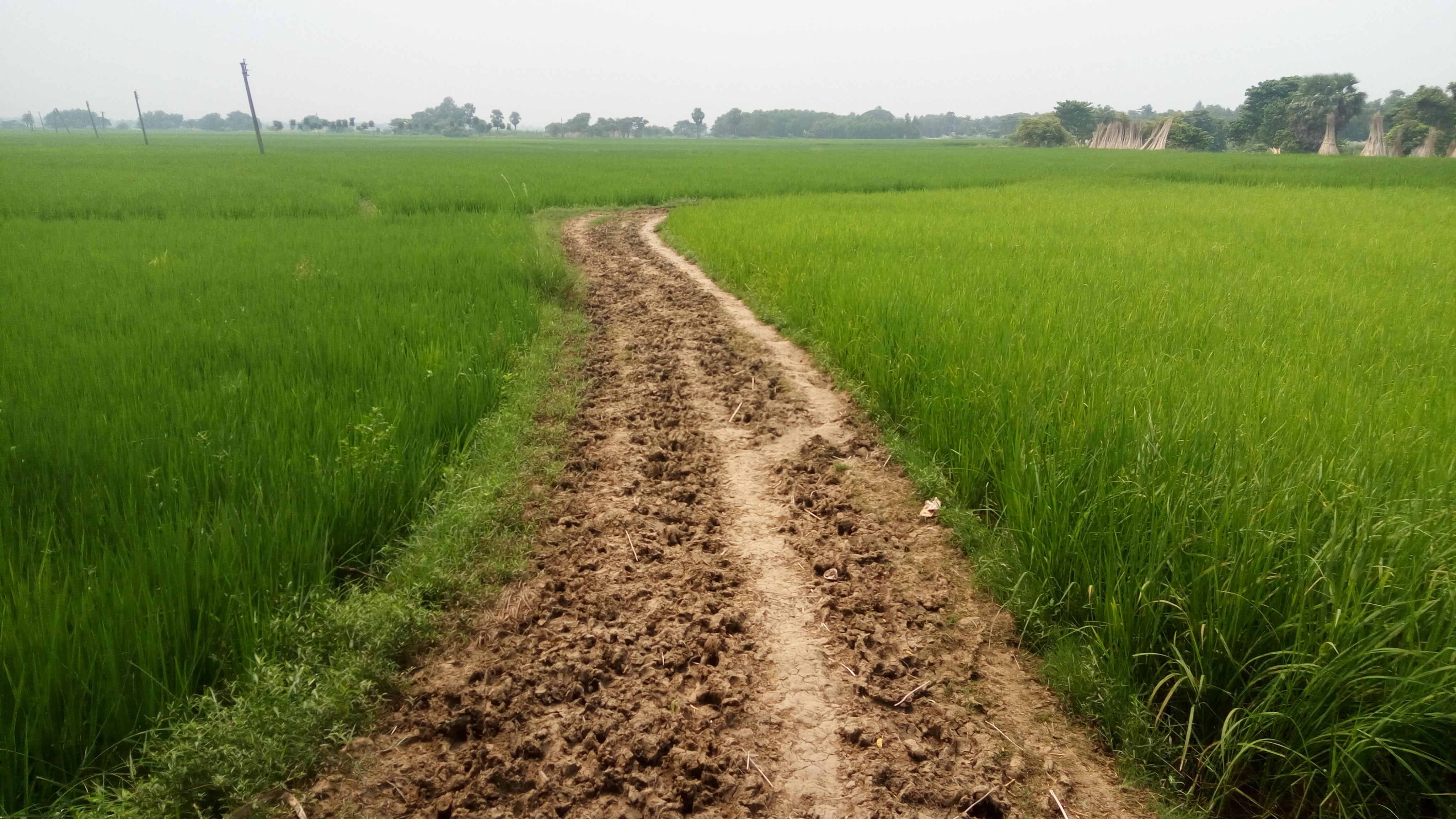
“Our village is also called the swimmers’ village because almost all of us including small children know how to swim. To learn swimming is not a luxury but a necessity for us. A person who doesn’t know swimming cannot survive here because boats are scarce and not always available,” says Kanhai Sarkar, a sexagenarian who lives in Uddharanpur Bidhanpally village falling under the Katwa subdivision in Bardhaman district of West Bengal, around 150 kilometres from Kolkata.
Surrounded by a canal on all sides, the village is virtually cut off from the rest of the state. The village with a population of around 2,000 had a bamboo bridge earlier that connected it to other villages but ever since that bridge collapsed in a flood in 2017, the villagers are literally marooned in their village with just a few boats and their own swimming prowess to the rescue. While women and children resort to rowing the boat, most men swim across. It is commonplace to see villagers removing their clothes, packing them in a bag and placing it inside an open umbrella for it to float to the other side of the canal while they swim across. 
Local residents say that the water flowing in the canal is from river Ajay that might have meandered from its course several years ago. Ajay river originates on a small hill about 300 metres (980 ft) high, southwest of Deoghar in Jharkhand and flows through Bihar and West Bengal. The river enters Katwa subdivision of Bardhaman district at Nareng village in Ketugram. The catchment area of the Ajay is 6,000 square kilometres.
“We got confined to this place after the bridge got washed away. Several pleas to the administration for building a new bridge were made but they have been fruitless so far. We have lost all hopes after running from pillar to post without any success,” rues Sarkar.
The lack of connectivity is not the only problem the villagers face. Sarkar says followed by the dangerous boat ride on the water about 30-40 ft deep to reach the village, one has to walk on a kutcha road for nearly two kilometres. “This stretch between paddy fields is too muddy and uneven to even ride a bicycle,” he says.
Unmarried, young men and women worry about future
The lack of connectivity is affecting the lives and livelihoods of the villagers. The Uddharanpur Bidhanpally village has around 30-40 young people who are unable to find suitable matches as outsiders are not willing to get their family members married here.
Bhaskar Mondal, a graduate says that he has failed to find a bride despite searching for quite some time. “Nobody is willing for any kind of alliance with us because of the pathetic connectivity. Those who still manage to reach here after taking all the trouble do not visit again. The youths of the village are unhappy that they cannot find matches despite having proper education,” he says.
Papiya Biswas in her 20s who has just completed her graduation agrees that the situation is indeed serious, “My parents are really worried about my future because nobody is interested in an alliance with the youth here as it is too difficult for them to come here,” she says.
Away from school: Students, teachers suffer
Sandip Kumar Barai stays just five kilometres from the only primary school in the village where he is the head teacher for the last six years. Normally, it shouldn’t take more than 15-20 minutes to reach the school. But Barai leaves his house at least two hours early just so he is able to reach the school in time. He walks for nearly two kilometres in the blazing sun on the kutcha road to reach the canal. Then he crosses it by oaring one of the few rickety boats on the water which is deep and has venomous snakes in it.

The 31-year-old calls it a daily routine but shudders to think of the days when there are no boats and he has to swim against the rising water level to reach his workplace. “It is difficult to imagine the situation unless you experience it firsthand. A lot of claims is being made about development but the reality is for all of us to see. I have to face the danger of venomous snakes while crossing the canal during heavy showers. Still, I have hardly missed a day because teaching is my passion which has kept me here despite all odds,” he says.
Sandip says the school has only till class IV after which children have to cross the river to reach other educational institutions for higher studies. “Parents do not want to put the lives of their wards in danger so most of them (children) quit school even without completing primary education. We have high dropout rates here,” he points out.
Livelihood difficulties due to high transport cost
Farmers complain that they often fail to get the right price for their crops as the transportation involves huge cost. They need to spend a minimum transportation cost of Rs 500 on the goods depending on the weight. “We have to hire a boat to transport the crops to a nearby market which is a costly affair. We sell the crops to the buyers who come to us but they offer much lesser price. We cannot afford to hire a boat and go to the market every time,” says Lalu Sarkar (32), a young farmer.
The health facilities are also in tatters as the nearest hospital is around eight kilometres away and often the golden hour is lost in transportation putting the lives of patients in danger. Last year, 50-year-old Nakul Mondal lost his life to heart ailment because he didn’t get the medical care in time.
When contacted, the pradhan of the local gram panchayat, Bikash Biswas, conceded that the situation is grave and requires immediate attention. “We had built a bridge by spending Rs 5 lakh under the MNREGA scheme but that got washed away in the water. We have already sent a budgetary proposal of Rs 60 lakh to the local MP for building a fresh bridge but he is yet to sanction the money. We also face huge economic losses due to this. We hope that the state government would look into it,” he says.
Surprisingly, the local Block Development Officer (BDO) was unaware of the presence of this village till he was informed by this correspondent, “I didn’t know that people in that village have to undergo such hardships. I will definitely request the state government to take appropriate steps but funds obviously are a constraint,” says Arijit Das, the local BDO.